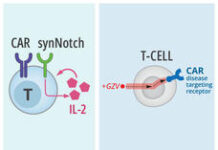, by NCI Staff
NCI’s collection of cancer information products is constantly growing, so we provide periodic updates on new and updated content of interest to the cancer community.
NCI Annual Plan & Budget Proposal for Fiscal Year 2023
Each year, NCI prepares a plan for advancing cancer research and proposes the budget required to fund a broad research portfolio, support the cancer research workforce, and sustain the infrastructure that enables rapid progress against cancer.
The NCI Annual Plan & Budget Proposal for Fiscal Year 2023 opens with a message from NCI Director Norman Sharpless, M.D., who writes that the advances made since the National Cancer Act of 1971 was signed into law have led us into a golden age of cancer research. The Fiscal Year 2023 plan highlights four areas of scientific opportunity that, with further investment, NCI believes will catalyze progress against cancer:
• improving cancer clinical trials
• designing drugs with computer-based approaches
• preventing cancer with precision medicine
• understanding tumor dynamics
Stories to Commemorate 50 Years of the National Cancer Act
The stories of the National Cancer Act’s impact are inspirational and educational, and they provide an opportunity to learn about the pioneers who have helped move cancer research and cancer care forward. The collection includes stories on people who have benefited from advances in treatment and care, such as Emily Whitehead, the first child in the world to receive CAR T-cell therapy, and about some of the researchers responsible for discoveries that have fundamentally changed our understanding of cancer.
NCI’s Cancer Community Partnership
NCI’s Cancer Community Partnership was created by the NCI Center for Cancer Training to connect the scientific and medical communities with people personally affected by cancer. The partnership is intended to help people affected by cancer, patient advocates, researchers, and health care providers learn from one another through inclusive conversations and to influence the development of cancer science and cancer care by integrating patient experiences at all levels.
NCI Early-Stage Surgeon Scientist Program
The NCI Early-Stage Surgeon Scientist Program (ESSP) is designed to train surgeon-scientists and retain them in cancer research by supporting a program focused on cancer-related disease and basic and translational research. This program aims to bring together surgeon-scientists from across the United States and assemble groups of surgeons that will be trained together for up to 3 years.
DCEG Strategic Plan
NCI’s Division of Cancer Epidemiology and Genetics (DCEG) lays out the division’s research priorities and objectives in its strategic plan. DCEG envisions a future of epidemiology that embraces the potential of new and emerging analytic technologies, exposures, and data sources.
DCEG Mentorship Stories
DCEG scientists have a longstanding tradition of mentoring young researchers working to uncover the genetic and environmental causes of cancer and the means to prevent it. This post shares the stories of several scientists from DCEG’s Integrative Tumor Epidemiology Branch (ITEB), including that of Branch Chief Gretchen Gierach, Ph.D.
The post is the second installment of the Mentorship at DCEG: A Tradition of Excellence series.
Video: The Frederick National Laboratory for Cancer Research: A Shared National Resource
The NCI-affiliated Frederick National Laboratory for Cancer Research (FNLCR) is the only Federally Funded Research and Development Center devoted to biomedical research. FNLCR operates as a shared national resource, collaborating with public and private partners to speed delivery of new therapies and prevention agents. The lab also conducts basic, translational, and preclinical research and development in cancer and AIDS.
Video: Patients as Partners in Discovery and Progress
This video commemorating the National Cancer Act of 1971 explains how people living with cancer, their caregivers, and survivors play a vital role in understanding and treating cancer and are helping to realize the promise of precision medicine.
News Release: Blood Test to Detect Cancers Early in People with NF1
Some people with the inherited condition neurofibromatosis type 1 (NF1) develop benign tumors, called plexiform neurofibromas, that grow along nerves. These tumors can sometimes turn into an aggressive cancer called malignant peripheral nerve sheath tumor, but determining whether this change has occurred involves tests that can be painful or inaccurate. NCI scientists have developed a blood test that could one day offer a highly sensitive and inexpensive approach to detect this transformation early in people with NF1. The blood test could also help doctors monitor how well patients are responding to treatment for their cancer.
Advances in Kidney Cancer Research
This new page highlights some of the latest research in kidney cancer, including clinical advances that may soon translate into improved care, NCI-supported programs that are fueling progress, and research findings from recent studies.
New Information on Types of Cancer Treatment
These updated pages explain various methods of treating cancer and which cancers each method is used to treat. Each page discusses how the treatment works, benefits and drawbacks, and possible side effects.
• Cryosurgery
• Hyperthermia Therapy
• Laser Treatment
• Photodynamic Therapy
Screening Tests to Detect Colorectal Cancer and Polyps
This updated page explains risk factors for colorectal cancer, screening tests that can find it early, and guidelines for who should have screening tests and when.
Cancer Therapy Interactions with Foods and Dietary Supplements
Commonly consumed food and dietary supplements can affect how some cancer therapies work. This new page, part of NCI’s PDQ cancer information collection, provides answers to common questions about a variety of foods and dietary supplements and how they may interact with cancer therapy.










